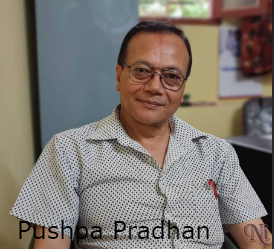-Pushpa Raj Pradhan, Chief Editor
The People’s Review weekly, Nepal

The results of the 20 November elections have already been made public.
Compared to the results of the 2017 general elections, the big three parties – NC, UML and Maoist Center – are seen as declining parties, meanwhile, the established Tarai-centric parties — Janata Samajwadi and Loktantrik Samajwadi — have been rejected by the voters.
Rastriya Swatantra Party has been able to establish itself as the fifth largest party after the Maoist Center with a surprising choice of voters.
Accordingly, Rastriya Prajatantra Party, with one seat in the 2017 general elections, has been able to bag seven seats through the First-Pass-The-Post voting and it is expected that around seven seats the party is going to bag through the proportional votes.
The Unified Socialist Party led by Madhav Kumar Nepal will stay as the sixth-largest party having failed to get the national party recognition.
Besides, Janamat Party led by C.K. Raut will have a minimum strength of five seats along with one seat from FPTP and four seats through the proportional election.
Accordingly, Nagarik Unmukti Party will show the strength of three MPs in the parliament. The other two parties – Nepal Majdoor Kishan and Rastriya Janamorcha will have one seat each with five independently elected MPs.
Notably, the leaders of the major political parties or say those from the ruling five-party alliance were all aware that they were unpopular among the voters. Therefore, the leaders from the five ruling parties developed an election alliance with the hope of becoming a strong party and enjoying power further. The electoral alliance didn’t work properly as they failed to score or increase their size despite an alliance.
The votes bagged through the proportional election are the real strength of the political parties. Compared to the 2017 elections, all big parties have lost their popularity, which has been seen from the declining number of votes for these parties in proportional elections.
On the other hand, Rastriya Swatantra Party, which was born just five months before the 20 November elections, has shown its strong presence in parliament along with seven directly elected MPs and above 15 MPs elected through proportional voting.
The newly born party is still unclear about its political agendas, nevertheless, a large section of observers believe, this is the party funded and supported by Christian groups focusing on anti-corruption drives.
If the Westerners and the Christians back this party and if the follows the Western agendas then very soon, this party will disappear from the political scene.
Rastriya Prajatantra Party (RPP), a party opposing the present political features — republicanism, secularism and federalism – has garnered the strength of around 14 MPs, which is encouraging.
While evaluating the declining number of votes for the parties carrying the Maoist agendas including a landslide decline of votes for the Maoist Center, it makes clear that the agenda of federalism, republicanism and secularism has been rejected by the people.
Unfortunately, those leaders who were discarded by the people are again planning to form the government and rule the country through an unnatural alliance.
It will be a blunder for the partners in the government and by the next five years, they will become further weak.
RPP with the victory of above a dozen MPs has been able to justify its agendas, however, it has no mandate to go to the government, which the leaders have to understand.
Meanwhile, weaknesses of the party have been seen as it was unable to bring all above 90 per cent of voters having Hindu and Buddhist beliefs and the majority of voters who favor a constitutional monarchy and oppose federalism. RPP should struggle further for strengthening its party organization and bring all the voters who want a Hindu kingdom and the removal of federalism.
Moreover, it should struggle against daylight loot and corruption in the country, which are the voters’ aspirations.
Text courtesy” The People’s Review weekly dated December 7, 2022, Kathmandu, Nepal: Ed.
Upadhyaya.
